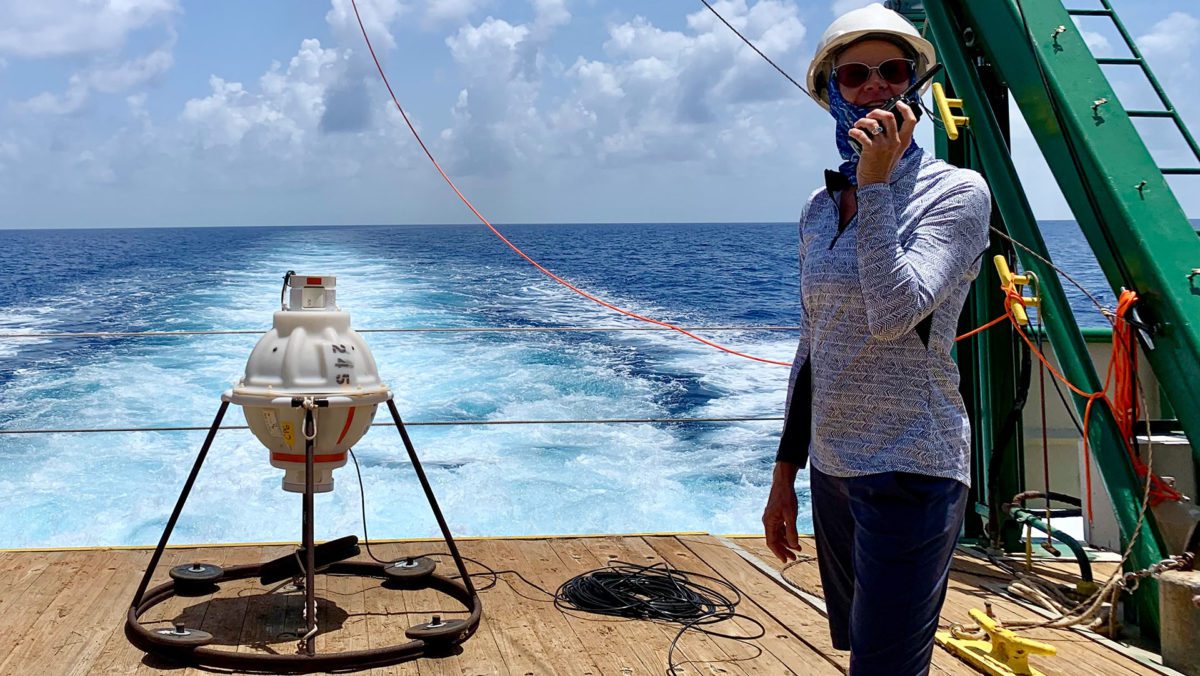New Study Definitively Confirms Gulf Stream Weakening
 Lisa Beal, professor of Ocean Sciences at the University of Miami’s Rosenstiel School, coordinates with the bridge officer by radio to deploy instrumentation that will monitor the Gulf Stream through the Florida Straits. Photo by: ©Paloma Cartwright
Lisa Beal, professor of Ocean Sciences at the University of Miami’s Rosenstiel School, coordinates with the bridge officer by radio to deploy instrumentation that will monitor the Gulf Stream through the Florida Straits. Photo by: ©Paloma Cartwright September 25, 2023
Woods Hole, Mass. — The Gulf Stream transport of water through the Florida Straits has slowed by 4% over the past four decades, with 99% certainty that this weakening is more than expected from random chance, according to a new study.
The Gulf Stream – which is a major ocean current off the U.S. East Coast and a part of the North Atlantic Ocean circulation – plays an important role in weather and climate, and a weakening could have significant implications.
“We conclude with a high degree of confidence that Gulf Stream transport has indeed slowed by about 4% in the past 40 years, the first conclusive, unambiguous observational evidence that this ocean current has undergone significant change in the recent past,” states the journal article, “Robust weakening of the Gulf Stream during the past four decades observed in the Florida Straits,” published in Geophysical Research Letters. The Florida Straits, located between the Florida Keys, Cuba, and The Bahamas, has been the site of many ocean observation campaigns dating to the 1980s and earlier. “This significant trend has emerged from the dataset only over the past ten years, the first unequivocal evidence for a recent multidecadal decline in this climate-relevant component of ocean circulation.”
The Gulf Stream affects regional weather, climate, and coastal conditions, including European surface air temperature and precipitation, coastal sea level along the Southeastern U.S., and North Atlantic hurricane activity. “Understanding past Gulf Stream changes is important for interpreting observed changes and predicting future trends in extreme events including droughts, floods, heatwaves, and storms,” according to the article. “Determining trends in Gulf Stream transport is also relevant for clarifying whether elements of the large-scale North Atlantic circulation have changed, and determining how the ocean is feeding back on climate.”

Chris Piecuch is a physical oceanographer at the Woods Hole Oceanographic Institution, and lead author on the study.(Photo by Daniel Hentz ©Woods Hole Oceanographic Institution)
“This is the strongest, most definitive evidence we have of the weakening of this climatically-relevant ocean current,” said Chris Piecuch, a physical oceanographer with the Woods Hole Oceanographic Institution, who is lead author of this study.
The paper does not conclude whether the Gulf Stream weakening is due to climate change or to natural factors, stating that future studies should try to identify the cause of the weakening.
“While we can definitively say this weakening is happening, we are unable to say to what extent it is related to climate change or whether it is a natural variation,” Piecuch said. “We can see similar weakening indicated in climate models, but for this paper we were not able to put together the observational evidence that would really allow us to pinpoint the cause of the observed decline.”
For the study, researchers applied what’s known as Bayesian modeling to combine thousands of data points from three independent data sets – from undersea cables, satellite altimetry, and in situ
observations – to determine the transport of water through the Florida Straits since 1982. Bayesian modeling uses probability to represent uncertainty within a model. The Bayesian model results provided clear evidence of significant long-term change. In addition, researchers found that omitting any one of the data sets from the analysis also indicated weakening. The paper states this demonstrates that transport weakening is a common signal that is not dependent on any one data set.
Piecuch explained the importance of the methodology by using a courtroom analogy. “When you are making your case, you need more than one witness, and you ideally want a collection of independent witnesses whose statements – when taken together – paint a consistent and coherent story,” he said. “We brought all the witnesses to the stand that we could technically involve to bring all these data sets together. Once we synthesized the testimony from all the different witnesses, they painted a very clear picture that, indeed, over the past 40 years the Gulf Stream has weakened by about 4%, which is significant. It’s more than you would expect if the current was stable; so, it’s an important change.”
“I have been studying western boundary currents—primarily the Agulhas Current off South Africa—for 30 years and it is only now that we are able to observe a robust trend in one of these extraordinarily dynamic systems. I believe this is a profound benchmark,” said article co-author Lisa Beal, professor of Ocean Sciences at the Rosenstiel School of Marine, Atmospheric, and Earth Science at the University of Miami, Florida. “Central to this paper is the Bayesian model developed by Chris, which provides a framework to carefully assimilate ocean observations of disparate quality and resolution. I think there is potential for this technique to extract other climate change signals from among the scattered observations we have in the ocean.”
The study builds on many earlier studies to quantify long-term change in Gulf Stream transport. While the weakening found in the current study is consistent with hypotheses from many previous studies, Piecuch noted that the current study is “water-tight” and is “the first unequivocal evidence of a decline.”
Piecuch said that the finding of definitive evidence of the weakening of the Gulf Stream transport of water “is a testament to long-term ocean observing and the importance of sustaining long ocean records.”
The current study, which is part of a bigger six-year project funded by the National Science Foundation to make new measurements of the Gulf Stream at the Florida Straits, emphasizes the importance of having long-term observations, he said. “The more subtle that the change is that you are looking at, the longer is the observational record that you need to be able to tease that subtle change out of an observational time series.”
“This paper explicitly demonstrates the value of these long observing systems to tease out very subtle signals. In this case, we showed that we needed more than 30 years of data,” Piecuch said. “Hopefully, this paper and our wider project will drive home the importance of funding and sustaining long-term ocean observing.”
Beal added, “The Gulf Stream is a vital artery of the ocean's circulation, and so the ramifications of its weakening are global. I used to think of the ocean as our last remaining frontier, wild, pristine, and
indomitable. It saddens me to acknowledge, from our study and so many others, and from recent record-breaking headlines, that even the remotest parts of the ocean are now in the grip of our addiction to fossil fuels.”
Funding for this research was provided by the National Science Foundation and NASA.
###
Authors:
Christopher G. Piecuch1*, and Lisa M. Beal2
Affiliations:
1 Physical Oceanography Department, Woods Hole Oceanographic Institution, Woods Hole, MA, USA
2 Rosenstiel School of Marine and Atmospheric Science, University of Miami, Miami, FL, USA
*Corresponding author
About Woods Hole Oceanographic Institution:
The Woods Hole Oceanographic Institution (WHOI) is a private, non-profit organization on Cape Cod, Massachusetts, dedicated to marine research, engineering, and higher education. Established in 1930, its primary mission is to understand the ocean and its interaction with the Earth as a whole, and to communicate an understanding of the ocean’s role in the changing global environment. WHOI’s pioneering discoveries stem from an ideal combination of science and engineering—one that has made it one of the most trusted and technically advanced leaders in basic and applied ocean research and exploration anywhere. WHOI is known for its multidisciplinary approach, superior ship operations, and unparalleled deep-sea robotics capabilities. We play a leading role in ocean observation and operate the most extensive suite of data-gathering platforms in the world. Top scientists, engineers, and students collaborate on more than 800 concurrent projects worldwide—both above and below the waves—pushing the boundaries of knowledge and possibility. For more information, please visit www.whoi.edu
Key Takeaways
- The Gulf Stream transport of water through the Florida Strait has slowed by 4% over the past four decades, with a 99% certainty that this weakening is more than expected from random chance, according to a new study.
- This is the strongest, most definitive evidence we have of the weakening of this climatically-relevant ocean current,” said Chris Piecuch, a physical oceanographer with the Woods Hole Oceanographic Institution, who is lead author of this study.
- The finding of definitive evidence of the weakening of the Gulf Stream transport of water is a testament to long-term ocean observing and the importance of sustaining long ocean records.
- The study does not conclude whether the Gulf Stream weakening is due to climate change or to natural factors, stating that future studies should try to identify the cause of the weakening.
- For the study, researchers applied Bayesian modeling to combine thousands of data points from three independent data sets to determine the transport of water through the Florida Straits since 1982. Bayesian modeling uses probability to represent uncertainty within a model. The Bayesian model solution provided clear evidence of significant long-term change. In addition, researchers found that omitting any one of the data sets from the analysis also indicated weakening. The paper states this demonstrates that transport weakening is a common signal that is not dependent on any one data set.
